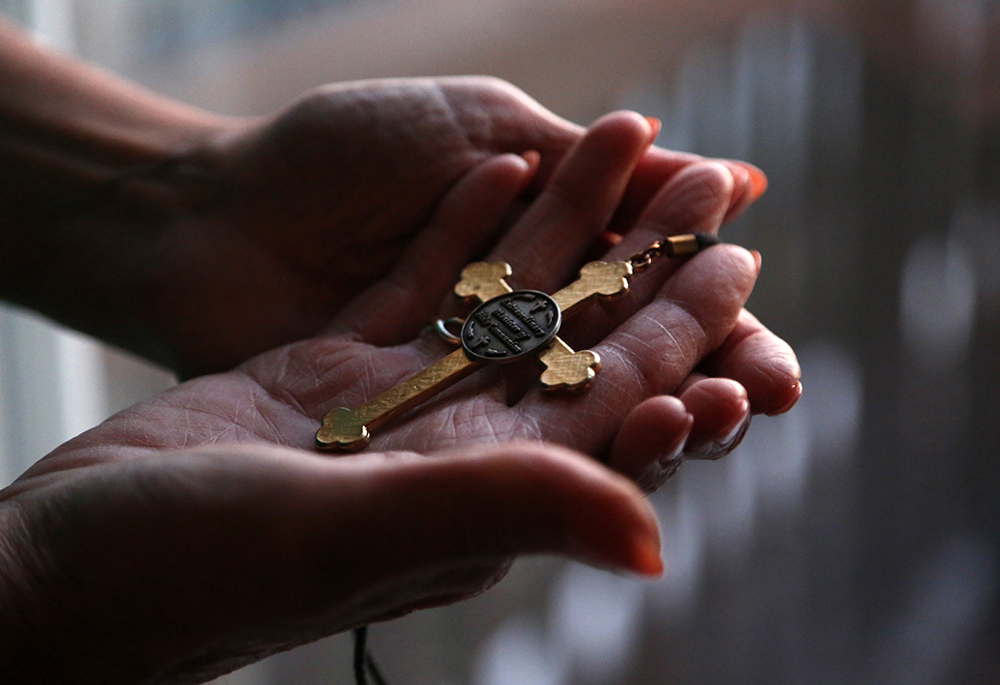
Christine Zuba holds the cross she wears when serving as a eucharistic minister at Sts. Peter and Paul Catholic Church at her home Feb. 14, 2022, in Blackwood, New Jersey. After coming out as transgender at age 58, Zuba, a lifelong Catholic, was welcomed into the parish. U.S. bishops issued a document dated March 20 rejecting gender-affirming medical treatments for transgender individuals and reasserting that such procedures must not be performed by Catholic providers. (AP photo/Jessie Wardarski)
In a March 23, 2023, address to members of the Pontifical Alphonsian Academy (also known as the Alphonsianum), Pope Francis sketched a vision for "the field of moral theology" deeply informed by the Second Vatican Council. He laments the "cold morality, theoretical morality, I would say a 'casuistic' morality" that he learned as a seminarian in the late 1950s. "Thanks be to God we have moved on," he exclaimed.
Three days earlier, the U.S. bishops' Committee on Doctrine issued a "Doctrinal Note on the Moral Limits to Technological Manipulation of the Human Body," a document prohibiting Catholic health care institutions from providing gender-affirming medical care to transgender patients. Apart from one citation, the document reads as if Vatican II never happened. It exemplifies the cold, casuistic morality that Pope Francis decried. Apparently for the doctrine committee, such a methodology has not moved on.
The contrast could not be more stark. Pope Francis' counsel to the Alphonsianum provides a broader context for understanding the many, glaring weaknesses of the doctrinal note. Specifically with regard to bioethics, he counseled:
I invite you to cultivate the patience of listening and exchange, as St. Alphonsus recommends for conflictual situations. Do not be afraid to listen. It will be fundamental for the search for common solutions, that recognize and ensure respect for the sacrality of every life, in every condition. This listening will then be decisively enriched by the adoption of transdisciplinary research methods, which enables an approach to new challenges with greater competence and critical capacity, in the light of the Gospel and human experience. Only in this way will it be possible to develop reasonable and solid arguments in the bioethical field, rooted in faith, adapted to adult and responsible consciences and capable of inspiring socio-political debate.
Bioethics, he continues, "must be attentive to the real dramas lived by people who often find themselves confused in the face of the moral dilemmas of life." And he called on his audience to "make the fruits of your work accessible by using the 'language of the people' and by formulating proposals for moral life that are practicable and humanizing."
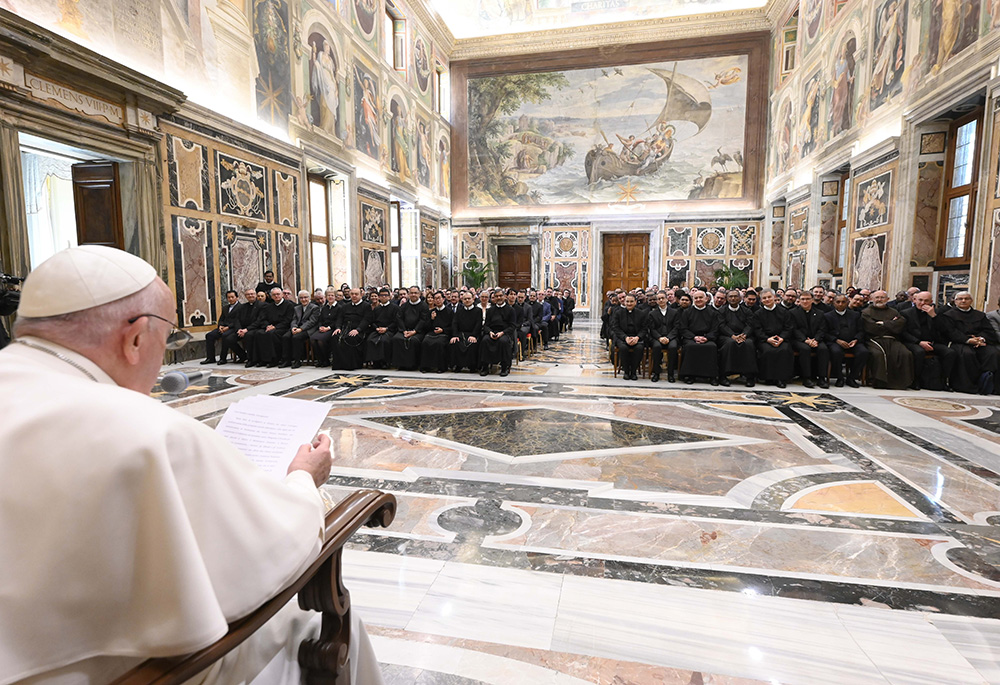
Pope Francis leads an audience at the Vatican with people who took part in a conference organized by the Alphonsian Academy March 23 in Rome. (CNS/Vatican Media)
As bishops, the members of the doctrine committee have an even greater responsibility to do these things. As outlined in Christus Dominus, the Vatican II document on the pastoral office of the bishop:
The bishops should present Christian doctrine in a manner adapted to the needs of the times, that is to say, in a manner that will respond to the difficulties and questions by which people are especially burdened and troubled. … Since it is the mission of the Church to converse with the human society in which it lives, it is especially the duty of bishops to seek out men [sic] and both request and promote dialogue with them. These conversations … ought to be noted for clarity of speech as well as humility and mildness in order that at all times truth may be joined to charity and understanding with love. Likewise, they should be noted for due prudence joined with trust, which fosters friendship and thus is capable of bringing about a union of minds [Paragraphs 13-14, emphases added].
In the doctrinal note, the committee members have failed in this key duty of their office. This document suffers from three significant flaws: intellectual, theological (or, troublingly, doctrinal) and moral. Unfortunately, these flaws bury and invalidate important points scattered throughout the document — that creation is good; that real questions should be raised about the technological paradigm and the economic dimensions of bioethical issues; that human fulfillment does need to take into account our alignment with and the flourishing of creation; that human nature, writ large and individually, is a gift; that the body ought not simply be instrumentalized; and so on.
These are important questions that require careful reflection, engaged discernment, and ongoing dialogue and accompaniment. One will find none of this in the bishops' document.
Intellectual flaws
In addition to requiring bishops to engage in dialogue with humility, mildness, charity and prudence, the Christus Dominus enjoins upon them a duty to speak in a manner that is clear, responsive to the context, using "a method suited to the matter that is being treated." This means that episcopal communications must meet basic standards for a careful, professional, well-reasoned argument. The doctrinal note does not.
Its ostensible purpose is to provide a moral/theological analysis for Catholic health care institutions of the spectrum of medical interventions that currently comprise the clinical standards of care established by the World Professional Association for Transgender Health, or WPATH, most recently updated in 2022. Yet bafflingly, neither the words "transgender" or "gender-affirming care" (as the standards are generally referred to) or any reference to WPATH appear in the document proper. The word "transgender" only appears in Footnote 34 (on Page 12 of 13), where the committee admits its neglect of pastoral issues. The terms "gender dysphoria" and "gender incongruence" each only appear once and twice respectively, three quarters of the way through the document. Thus, on just a surface level, the document is bizarre: Transgender persons do not appear in a document about transgender persons and their medical care.
This is mystifying. A necessary first step in any adequate scientific, intellectual or moral analysis/argument is to provide a careful, charitable, accurate description of the issue or topic — the "facts of the case," as it were. This entails defining one's terms (accurately and charitably), providing relevant statistics or other data (e.g., prevalence of transgender, trends), documenting relevant social factors (e.g., suicide, poverty and homelessness rates; cultural histories; and data regarding discrimination). Crucially important here would be information on the evolving legal landscape in the U.S., since, as of March 2023, some 435 anti-LGBTQ+ bills have been introduced. The committee does none of this.
This sort of background is necessary for giving credibility to an analysis and its conclusions. It establishes, especially to those who might disagree, that the authors know what they are talking about, that they have considered all the relevant dimensions of a question, and they have not misunderstood or misrepresented key aspects of the issue, either accidentally or intentionally. This is particularly important when analyzing emerging issues that are new, evolving and complex.
For the same reasons, an essential second step in any adequate, professional analysis or argument is to carefully and charitably summarize the arguments and positions of one's interlocutors before turning to refute them. The committee makes no attempt to do this. In the few places where they gesture toward opposing positions, they tend to state them inaccurately.
The committee also omits what is now widely understood to be a crucial third step in any adequate professional analysis/argument, namely, to include in one's process the voices, experiences and perspectives of the people about whom one is speaking and who would be primarily affected by one's conclusions.
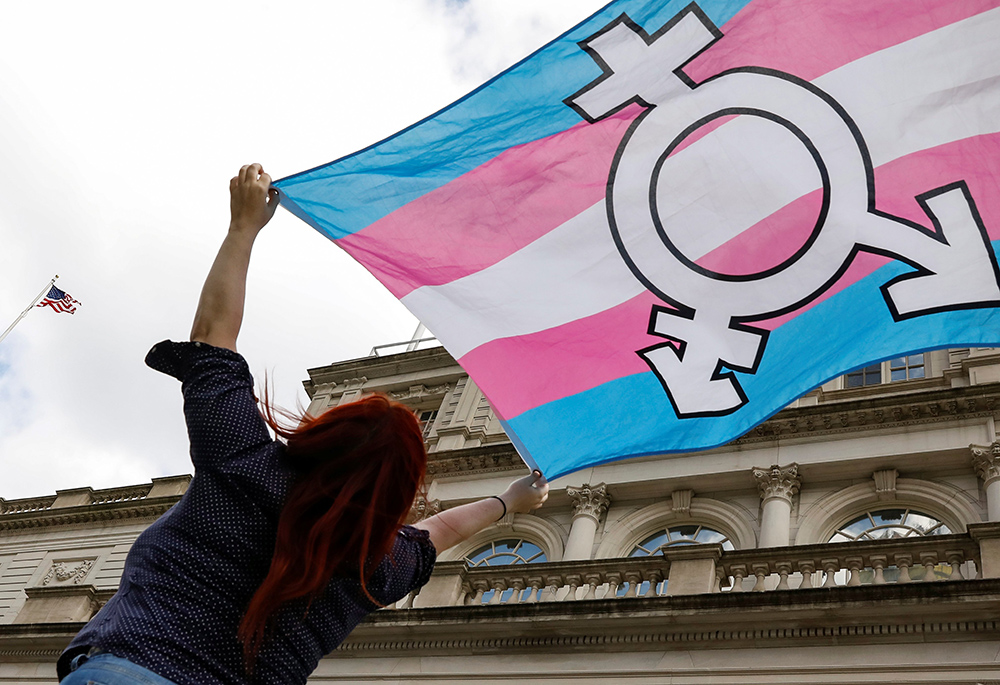
A person in New York City holds up a transgender flag Oct. 24, 2018. (CNS/Reuters/Brendan McDermid)
As Pope Francis notes to the Alphonsianum: "Moral theologians … are required to enter into a living relationship with the People of God, engaging in particular with the cry of the least, to understand their real difficulties, to look at existence from their perspective, and to offer them answers that reflect the light of the eternal love of the Father."
This step is not only absent, there appears to be a refusal in the document to use any of the language preferred by transgender people and the professional community that treats them or to acknowledge the reality of transgender persons. This is consistent with a number of recent diocesan policies — and state legislative initiatives — which explicitly prohibit the use of the words gay or lesbian or transgender.
All of this snowballs into further problems. For example, although the document is putatively about the WPATH standards, the committee does not do the work to carefully name and then analyze the various WPATH interventions. Instead, it substitutes other language, specifically, the rhetorically loaded language of "technological manipulation." Problematically, apart from a prooftexted quote from Laudato Si', this phrase appears only in the title of the document and in the subheading of the conclusion. In other words, the committee offers no argument to justify categorizing the WPATH standards as technological manipulation; they simply assert this as the frame of the entire issue.
This failure is compounded by further conceptual incoherence. The committee obliquely compares the WPATH standards to very different types of interventions ("genetic engineering" broadly construed and "cybernetic enhancement" — which they admit only exists hypothetically). They then fail to do the hard work of carefully comparing analogous cases, which is a basic step in Catholic moral methodology and even in secular bioethical method. They do not carefully demonstrate why certain medical interventions have been considered acceptable per Catholic moral teaching (e.g., pubertal suppression in girls with mental disabilities, hormone therapy for menopausal women, breast implants for teenage girls) while the use of these same interventions for transgender persons are rejected whole cloth. With regard to cosmetic surgery to enhance the physical beauty of non-transgender patients, they simply say it "could be morally licit, if undertaken with the correct intention and in the correct circumstances" (Paragraph 10), without raising any concerns about this form of "technological manipulation" or providing any justification.
None of these issues have anything to do with theological method. These are flaws in basic analysis and argumentation. But they are also necessary — in fact, even more important — for theological arguments. Yet the problems with their theological method are equally extensive. Theologian Fr. Daniel P. Horan has identified a few. Let me name just three more.
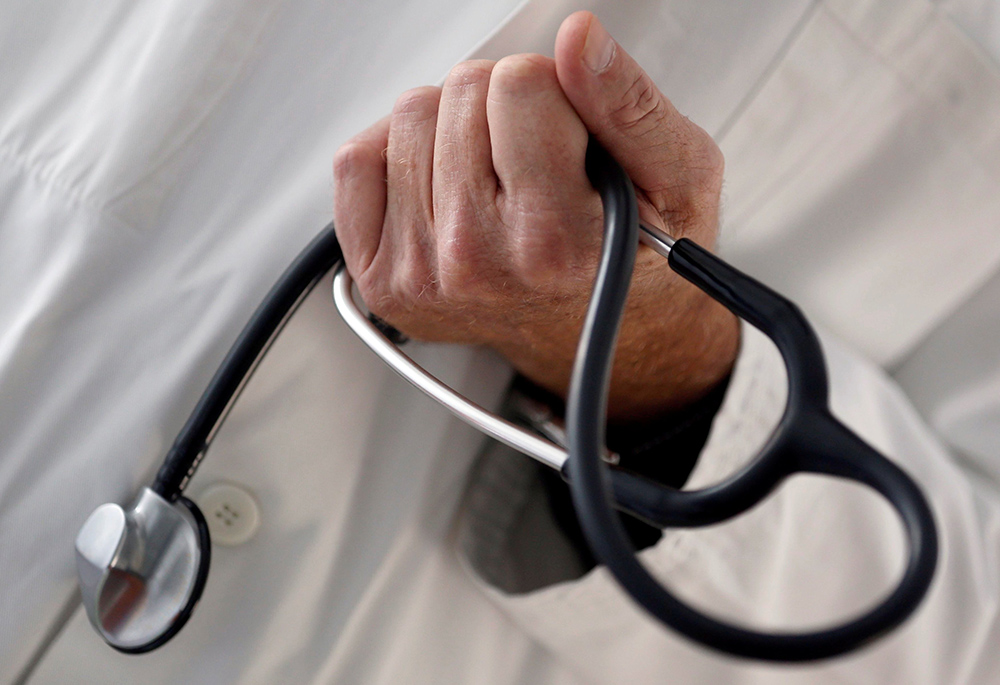
A doctor holds a stethoscope in this illustration photo. (CNS/Reuters/Regis Duvignau)
Theological/doctrinal flaws
The committee could not have provided a better example of the desiccated moral theology Pope Francis critiqued in a 2013 interview — a moral theology unduly focused on "small-minded rules," a legalist and restorationist "obsess[ion] with the transmission of a disjointed multitude of doctrines to be imposed insistently."
The committee quite overtly utilizes solely the methodology of the pre-Vatican II manualist tradition. They begin (in Paragraph 2) by asserting a natural law framework that dictates not only the fundamental theological conviction — widely agreed upon among Catholics and Christians — that God created all of creation and all human persons and created them as good. But immediately, they slide from this general conviction into a rapid-fire cascade of assertions (a disjointed multitude to be sure):
- That God created an order. The word "order" appears 42 times in 13 pages.
- That this order is inscribed in human bodies.
- That what is intrinsically inscribed is a binary sexual differentiation.
- That this sexual differentiation makes men and women fundamentally different in every way (" 'not only on the physical level, but also on the psychological and spiritual, making its mark on each of their expressions' ").
- Which is then " 'disclosed in the spousal character of the body' " (emphasis added).
- Which is foundational to " 'small communities or of society as a whole' " (emphasis added).
Each of these claims—enormous, complex, often contested within and beyond the Catholic Church — are all simply asserted via prooftexts from the Catechism and select papal documents.
Advertisement
Half of the 34 papal citations come from Pius XI and XII. The analysis of what the committee considers the pith of the issue ("when the sacrifice of a part of the body is necessary for the welfare of the whole body") relies entirely on Pius XII. Bizarrely, the committee also attempts to use the distinction between ordinary/extraordinary means of care — a principle that clearly does not apply at all. Thus, apart from a few random quotes, this document could have been written in the 1950s.
Second, the committee conflates two meanings of the word "nature" (which appears 15 times). They slide back and forth between "nature" as a biological reality and "nature" (or more specifically "human nature") as a philosophical or theological construct. This is a long-standing problem with Neo-Scholastic approaches to natural law that critics have noted for decades. Many of the claims listed above are biological claims, and recent biological research has, at minimum, begun to complicate them. But no studies are cited, not even in support of their position. Instead, superficial assertions about "biology" are marshaled as the foundation for absolute social and philosophical claims about "human nature" that are precisely at issue.
Third, as Pope Francis has noted, the search for "disciplinarian solutions [and an] exaggerated doctrinal 'security' " rooted in a past that no longer exists leads to an inability to prioritize the essential truths of the Christian kerygma. We see this same doctrinal lapse in this document. For we might ask: Who is God in this document? On the one hand, it's hard to say, since unlike Pius XII, God is hardly mentioned. In the document, God is simply "the Creator." And what did God create? God created order. God, as depicted here, is largely a deist god — a god who created an invariant universe with laws and order that must be invariantly followed. It is the voluntarist God of Neo-Scholasticism, so ably described and critiqued by moral theologian Dominican Fr. Servais-Théodore Pinckaers — a god who wills, a god who established the moral law by designing, planning and ordering nature.
Apart from a few random quotes, this document could have been written in the 1950s.
As Pope Francis cautions in Evangelii Gaudium, "With the holy intent of communicating the truth about God and humanity, we sometimes give them a false god or a human ideal which is not really Christian. In this way, we hold fast to a formulation while failing to convey its substance. This is the greatest danger. Let us never forget that 'the expression of truth can take different forms. The renewal of these forms of expression becomes necessary for the sake of transmitting to the people of today the Gospel message in its unchanging meaning' " (Paragraph 41, quoting John Paul II).
This is unfortunately the case with the doctrinal note. For the god we meet here is a mono-tarian god, (not a Trinitarian one). Jesus is, at best, an afterthought, mentioned only twice, in the final two sentences. The Holy Spirit is not mentioned at all. And Scripture is reduced to two prooftexts — Genesis 1:27, 31 (with a cf. to Psalm 19). This is not a conciliar moral theology, "nourished by the Sacred Scripture" as the Second Vatican Council called for, as Pope Francis reminded the Alphonsianum.
Moral flaws
As a result of all this, in my opinion, this doctrinal note is morally flawed as well. In failing to follow the basic standards of a reasoned argument, the committee fails to exercise the intellectual virtues, defined by Thomas Aquinas as knowledge, understanding and wisdom. No attempt is made to gather, present or evaluate the best science and knowledge. The document demonstrates what appears to be a willful misunderstanding of the nature of the issue; thus, in the end, the document fails to embody wisdom.
Equally, it fails to demonstrate many of the basic cardinal virtues. Providing such a poor analysis in such a fraught sociopolitical context does not demonstrate prudence. Failing to exercise the patience needed to wait for the necessary knowledge on this issue to unfold, it fails to demonstrate temperance. As it provides no evidence of being formed or transformed by charity — exhibiting no self-emptying love for those who are suffering via encounter and accompaniment — it likewise fails to exercise that theological virtue.
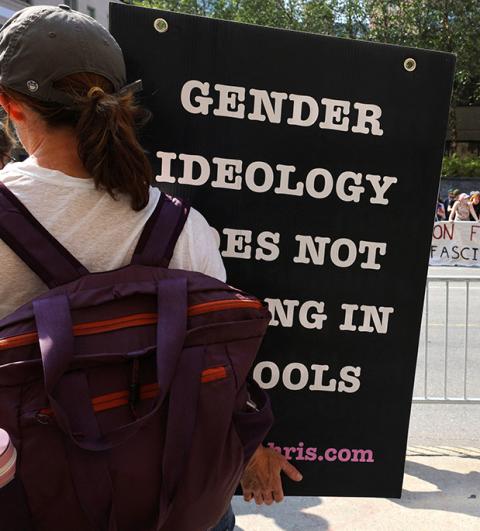
A person protesting medical treatments for youth who identify as transgender stands across the street from counterprotesters outside Children's Hospital Sept. 18, 2022, in Boston. Surgery and medical intervention to change a person's "sex characteristics" to those of opposite sex "are not morally justified," the U.S. bishops' doctrine committee said in a statement issued March 20. (OSV News/Reuters/Brian Snyder)
It is, additionally, disrespectful. In failing to follow the basic standards of reasoned discourse, it disrespects its audience — health care providers and ethicists and mission leaders, many of whom have greater expertise in this topic and who understand the standards of professional discourses. In refusing to use the language of transgender and acknowledge the realities of transgender persons, they effectively erase them as persons.
This is an ideological move, an egregious failure to honor their dignity as persons. It directly contravenes the witness Pope Francis has been providing for the past 10 years, as he counsels again to the Alphonsianum: "Problems are solved by walking ecclesially, as the people of God. And to walk with people in the moral state in which they find themselves. Walking with them and looking for a way to solve their problems, but walking, not seated like doctors with a finger raised to condemn without concern."
Because of these intellectual, theological and moral flaws, in the end, the doctrinal note and its prohibitions provide no real guidance to Catholic health care professionals who will continue to face practical questions as they accompany real persons and seek "to mitigate the suffering of those who struggle with gender incongruence" (Paragraph 18), as they have been for many years. Fortunately, as Catholic writer Helen Hull Hitchcock outlined decades ago, a document such as this one — issued by a committee without approval of the conference — has no binding authority.
The committee had an opportunity to open a real conversation both within the church and with our culture more broadly on these questions, and to begin to rebuild the credibility the U.S. bishops' conference has lost via the sexual abuse crisis and its role in the culture wars. Instead, they chose a path that closed off further dialogue and further undermined the church's credibility. On the upside, the committee has demonstrated conclusively that the manualist method — the cold morality that persists as a remnant of another era — is intellectually, theologically and morally bankrupt.
I hope going forward that the Committee on Doctrine will heed a final word from the Holy Father's remarks to the Alphonsianum — to avoid "extremist, polarizing dynamics," and instead "apply instead the principle, always indicated by St. Alphonsus, of the 'middle way,' which is not a diplomatic balance, no; the middle way is creative, it arises from creativity, and it creates."








